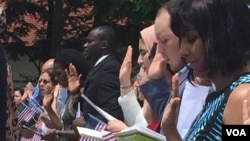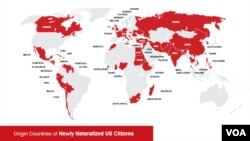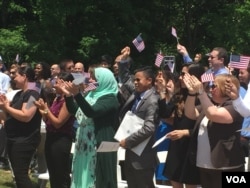On the sprawling estate of the nation's first U.S. president at Mount Vernon, Virginia, 100 people raise their right hands and pledge allegiance to their new country. It's the final step in a naturalization process that has taken some of them years to complete.
"I am very, very, very happy," said Maha Rafeh, an Egyptian native. Her smile is framed by a green hijab artfully draped over her head, and she waves a small American flag. Nearby, her son and daughter capture every second of this life-changing moment on cellphones. Rafeh has been working toward this for 10 years.
"I can't imagine I reach this moment, now after hard time," she said.
This naturalization ceremony is the last step in the process for people born outside the United States and seeking to become Americans. The event is held to swear in green card holders who have fulfilled specific requirements set by Congress: a command of the English language and knowledge of U.S. government and history, biometric scanning, and about $680 in fees.
After these candidates, hailing from 53 countries, take the oath of allegiance to the U.S. Constitution, an actress playing Martha Washington — the country's first first lady — offers greetings and tea to some of the newly minted Americans. They and their loved ones celebrate the milestone with hugs and kisses, taking snapshots set against the backdrop of first President George Washington's home, just south of the nation's capital.
Such ceremonies take place across the country throughout the year. In 2015, nearly 730,000 residents were naturalized, according to U.S. Citizenship and Immigration Services, or USCIS.
"Compared to last year, USCIS has seen an increase in naturalization applications," Jim McKinney, public affairs officer for USCIS, told VOA by email.
In an election year where the issue of immigration has been brought to the forefront, McKinney would not speculate on the reason for the increase.
"Application numbers ebb and flow from year to year, and even within the year," he said.
Rights, responsibilities
Among these new citizens is a palpable sense of their newfound rights and responsibilities. For Friederike Kaiser, who comes from Canada, U.S. politics was of great interest before she was even in the country.
"Being able to vote is something I'm really looking forward to," she said.
The wife of a U.S. serviceman, she says she has been following the presidential race closely and considering the candidates.
"It's been a really interesting election cycle already, and it's just beginning," she said. "We still have a long way to go before November."
For Magalia Letlow, originally from Guyana, a chance to have a say on how the government is run is also a priority, along with better employment opportunities.
"Being able to get more jobs, that's the best thing, that more doors are going to be open for me," she said. Many information technology and government jobs require U.S. citizenship.
A government job was, in fact, Romel Gayagoy's path to citizenship. Born in the Philippines and brought up in Miami, Florida, he serves in the U.S. military. Most naturalization applicants have to spend at least five years as permanent residents, but members of the U.S. armed forces and recently discharged service members can obtain U.S. citizenship more quickly. For Gayagoy, it made sense to use the expedited track while serving the country he calls home.
"I feel like I've been a U.S. citizen for a long time, but this seals the deal," said the officer, dressed in his Army uniform. "It's an honor."
Egyptian-American Rafeh giggles as she shows off her naturalization certificate — the proof that she is now entitled to the same benefits as anyone born in the U.S. Along with her excitement for the day is a profound appreciation for what she sees as a sense of order in the U.S.
"Everyone follows the law. Everyone respects the law." When asked, however, what she loves most about the U.S., her excitement wells up again: "Everything."
WATCH: 100 New US Citizens Are Sworn In








